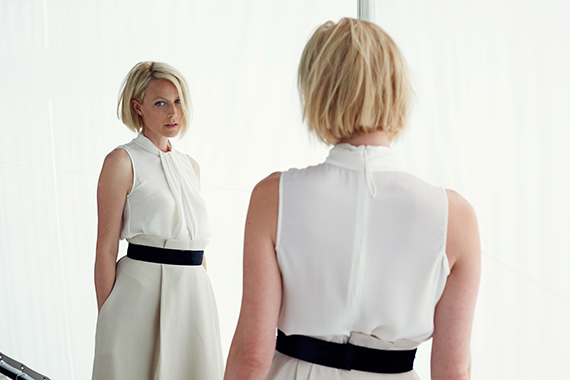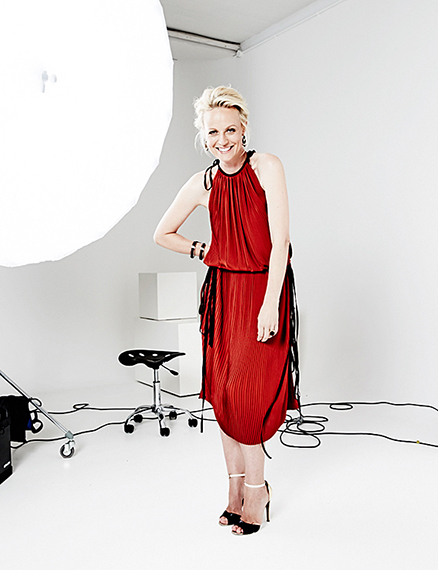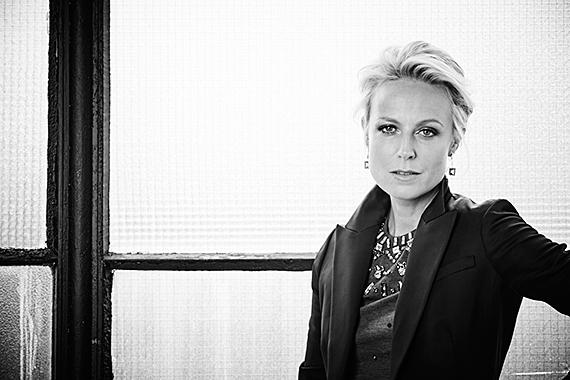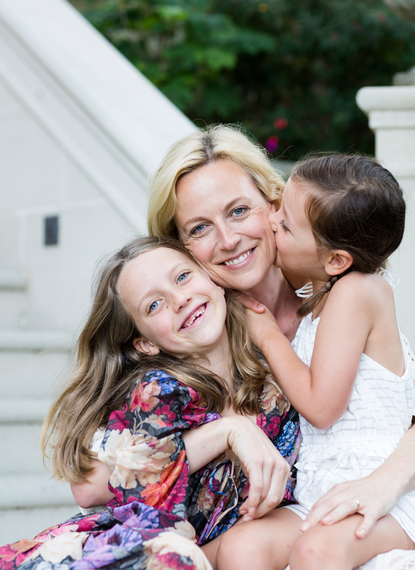
Marta Dusseldorp. Photo: Ellis Parrinder.
"So," I asked the woman with the Australian accent on the other end of the telephone line, "when did you find out your show has become a hit in the U.S.?"
"When I got a call saying an American girl wanted to interview me!" she laughed.
For my part, I was surprised. "She" is Marta Dusseldorp, star of A Place to Call Home, a period drama out of Australia, the first season of which aired on several PBS stations this year. And the American girl who wanted to interview her, well, that's me. Frankly, I feel a bit like an explorer who has landed upon something special. If you haven't yet heard of either Marta Dusseldorp or A Place to Call Home, you're in for a treat.
Let's start with a show primer. A Place to Call Home, or APTCH, the brain child of creator Bevan Lee, first aired in Australia on the Seven Network in 2013. Audiences around the country flocked to the show, and its ratings were high -- the top-rated Australian drama of 2013. Even so, love is not money and the ratings waned, and in June 2014, in the middle of season two, the Seven Network cancelled the show for "programming reasons." Word on the street is that the audience skewed too old (less appealing to advertisers), and the show was too expensive to produce. The network aired the remaining episodes of season two, and the show was over.
Knowing there was a possibility that the show would not have a third season, Marta told me, the producers filmed both a season two finale with twists and turns leading into season three, and a series finale, which would wrap up all storylines as best they could. With the cancellation of the show, the series finale was aired, and that was that.
Or so they thought. The fans, however, would have none of this cancellation. Online petitions were drawn up, Facebook pages were formed. An uproar was roared. The fans demanded to be heard.
And, the fans were heard. Seven Network did not come to the rescue, but another station did. In October 2014, "Foxtel came in and said, we love it, we'll order two more seasons," explained Marta (Foxtel is a "subscription television platform," like cable TV; the show will be aired on its SoHo channel). Eighteen months after filming ended on season two, filming on season three began.
Meanwhile, somewhere in the U.S., someone at PBS heard about the show and was intrigued. I don't know the ins and outs of the wheelings and dealings, but just a few months later, in April 2015, APTCH had made the leap across the Pacific Ocean and was airing in eight PBS markets across the U.S., with the three primary markets being Seattle, Atlanta, and Indianapolis.
Seattle! I'll tell you, I love my PBS station, KCTS 9, and can always count on them to bring fantastic programming to my TV. They didn't let me down this time, either. I saw the new show mentioned in a KCTS tweet in late March or early April, a few days before it aired. I watched, and was instantly hooked.
Wanting to find out more about Marta and the show, I reached out to Marta's people. Much to my delight, Marta agreed to an interview. After some navigation around her intense filming schedule and the seventeen-hour time difference between her home in Sydney and mine in Seattle, I finally had the chance to chat with Marta last weekend.

Marta. Photo: Jason Ierace.
I was won over from the moment we began talking. Life can be chaotic, but Marta's smooth, low voice is reassuring, soothing. She was warm, friendly, and welcoming, and I was instantly at ease. She comes across as a woman who is at peace, content, strong, happy with her life. She's the kind of person who, when you talk with her, makes you feel like everything is good, everything is going to be okay. Talking with her makes you want to be her BFF and have her call, every now and then, and remind you of just that: everything is good, everything is going to be okay. Have her come visit you in Seattle, and you'll go visit her in Sydney ... wait, am I projecting? Well, I've had a desire to go back since I visited Australia in 1989. ("1989!" exclaimed Marta when I told her that's when I was last in her home country. "Things have changed a lot since then!")
Anyway. Since American audiences aren't as familiar with Marta, I asked her to take us back to the beginning.
"I was a ballet dancer from the age of four," she told me. Even in her childhood years, she was fully immersed in her craft. "That's all I did. I didn't go to parties or anything." Somewhere around age ten or eleven, she acted in a school play. At some point during the play, the audience, about 300 strong, all burst into laughter as a single entity, and she realized she had the power to bring joy. She was hooked.
"I knew from a very young age," she said. "I thought, this is amazing, this is what I want to do for the rest of my life."
Marta lost her brother at a very young age, as well, and acting provided an escape. "I found a great peace in pretending, and being someone else, to deal with that grief and trauma," she said.
She went on to major in theater and film at the University of New South Wales in Sydney. Immediately after leaving school she began work in her chosen field, and she's been at it ever since.
Initially, Marta worked in theater, thrilling to the organic experience shared with a room full of strangers. "An audience is like a singular beast, it becomes one persona," she said. "There's nothing like a whole room, when they erupt into one huge roar, I guess it's as close as you get to a sporting event. There's this incredible moment when people come together as one."
In a 2013 interview with Alexandra Spring of Vogue Australia, Marta said, "I'm a sucker for that live thing. And I'm more courageous on stage ... more daring. I'm starting to try to do that more in TV. And theatre's much bigger so it can afford bigger choices, and I miss those outrageous choices I used to try and make, and sometimes pull off."
I asked her about that: what did she mean by "outrageous choices," and what is it about TV that prevents her from making those choices?
"I think I used to want to shake off any kind of image people might have of me," she said. "My father's Dutch, I have a European look, so I always felt like I didn't belong in Australia, didn't look Australian."
She explained that many Australian women are quite petite, and she is not. "So I tried to be the opposite, bold and brash." For example, when she did the play War of the Roses, she had a scene with the man playing her lover in the play, and they decided to do it as dogs, rolling and crawling around on the ground, the audience screaming with delight.

Marta. Photo: Jason Ierace.
Marta moved into TV a few years back to give her greater flexibility in being home with her family -- husband and fellow actor Ben Winspear, and their young daughters Grace and Maggie. Since working more in TV, she now believes TV offers plenty of opportunity for daring moves, too.
"Television is incredibly impulsive," she said. "You have to come up with choices really quickly. There's not the luxury you have in theater of mulling it all over."
Her time in TV has been busy, now more than ever. Before A Place to Call Home, she starred in a legal drama called Crownies in 2011. In early 2014, her character in the show, Janet King, got a spin-off show by the name of Janet King, with Marta as the main character. At the same time, she's starring alongside Guy Pearce in Jack Irish, a series of television movies adapted from the detective novels by Peter Temple. All of this while also acting in A Place to Call Home -- putting Marta in three shows on two different networks at the same time.
Researching Marta's other shows, which all look great but aren't aired in the U.S., I pondered the fact that not a lot of Australian shows make the jump across that very big Pacific pond. Marta isn't surprised that APTCH did, though. "I always thought [the story] was universal," she said. "The things it explores are much more than just downtown Australia."
I offered up to Marta my description of A Place to Call Home, and asked her for hers. First, I said, of course, it's a period drama, as it takes place in 1950s, post-war Australia. Beyond that, I see it as the story of how the shame of our secrets and desires and the mistakes we make when we're just trying to do the right thing can tear our relationships apart, and how love and forgiveness can redeem us. It's about the idea that we are all doing the best we can, with the best of intentions, but our paths and our choices divide us.
From Marta's perspective, APTCH is "about identity, and feeling at home culturally, about a woman who is seeking a silence, a peace, but it's not possible. She's like an albatross that can't ever land. Finally she comes home to her mother who rejects her outright because she's converted to Judaism.... It's about people's inability to accept people who they are." And, on a deeper level, said Marta, "It's about a time that was bourgeoning in Australia, but also had a disrespectful, righteous, nasty strain running through it ... it's about how far we've come, and how far we have to go."
Largely billed in the U.S. as "Downton Abbey Down Under," A Place to Call Home has much greater depth than the comparison suggests.
"It wasn't a Downton Abbey ripoff," said Marta. "It's about who we [Australians] are post-war, the secrets and lies that come with that, that still need to be negotiated." Australians are proud of who they are, and how far they've come, she said, but people are aware, "That conversation needs to keep going. People want that, grander looks at our cultural voice." As such, Marta said, the show has opened up a space for conversations.
The show is "epic and far reaching," she said, in a way Australian audiences aren't as used to. In the U.S., she said, "Your shows really reach quite big and grand. We're not so used to that in our storytelling." The challenge of the APTCH production, therefore, lies in "teaching Australian audiences about big and grand storytelling, epic storytelling," at the same time as they're enjoying it.
Since many haven't seen the show I won't go into any spoilers, but the basic premise, from Amazon is:
In 1950s Australian society, sex, death and secrets are never far below the surface in A Place to Call Home. Marta Dusseldorp leads the cast as Sarah Adams, a woman with a mysterious past who returned to Australia after twenty years abroad. The idyllic way of life in Inverness continues to work its magic on Sarah, enabling her to heal from the horrors of World War II and find love again and A Place to Call Home.
"It's such a privilege to be central to a story," said Marta, "because you get to show different sides with different characters." None of us, she pointed out, is single-sided. We all have multiple aspects to who we are; we all shade our interactions based on whom we're with. She is thrilled to have the opportunity to portray such depth in a character.
One of the many reasons I love the show is the strong female characters. I mentioned that there's so much discussion in Hollywood these days about the need for strong female roles; A Place to Call Home has several. In fact, Marta told me, the first two roles cast were the matriarch, Elizabeth Bligh (Noni Hazlehurst), and then Sarah Adams (Marta). All other roles waited until those key roles were in place.
"The creator [Bevan Lee] loves women, loves women who are strong and complicated and compassionate," said Marta. In creating the character of Sarah Adams, he could only have hoped for someone like Marta for the part. Marta's portrayal of Sarah can be mesmerizing. Again without spoiling anything, Marta faced the challenge of playing a character who has faced hardships most of us have not endured. In this, she succeeds, coming across the screen with a quiet but deep infusion of strength and calm. You get the sense that there is nothing Sarah Adams can't handle, that she goes through life with the attitude that she's survived the worst; now she can survive anything. Sarah is at the same time rock-hard and private, yet willing to be open; she carries a confidence that if something is going to kill her, being open with her emotions isn't it.
I mentioned that one of my favorite relationships in APTCH is that of Sarah and Roy Biggs, a rough and rugged farmer in whom Sarah finds a true friend. Marta agreed. "Frankie J. Holden [who plays Roy] is the most beautiful man you'll ever meet. He's funny and sincere and has a weight of experience in his life that he brings to the show," she said. "He's the first one on the set to ask you if you need a cup of tea, to crack a joke if you need it." As for the Sarah/Roy connection, Marta said, "To Sarah it's a father figure." Things happen [no spoilers!] in season two that bond them, and, Marta said, this continues in season three, which will air in Australia starting in September.
With the renewal of APTCH for two more seasons, Marta's schedule is packed. The day we talked, she had about a week left of APTCH filming, then was going to move straight into filming Jack Irish the next week, then on to Janet King again. Marta takes this busy-ness in stride. "A year ago I didn't work for a while. It all averages out," she said.
Marta claims not to be ambitious, "but I'm incredibly serious about what I do." In her off-time, she's started developing her own projects. "It's all in very infant stages," she said. "It's an idea I had. Why not? I went to a writer, we're working on it, we're going to keep going with it. I also pitched some other people's ideas to networks.... I'm feeling like I have enough experience now to help seed ideas. I like the idea of getting into a producing role and being up front with projects. I'm happy to fail," she explained; she's happy to take on that burden on the road to success. "I'd like to generate my own work. I could do without an audition ever again in my life!" she laughed.

Marta with her daughters Maggie and Grace. Photo: Luc Rémond.
In a recent Vogue Australia interview, Marta commented that, "The last year, I guess I was developing an identity: Who is Marta?" I asked her what she has discovered in her soul-searching. Who is Marta?
"I'm a mum of two beautiful girls, they're very present children. They don't think very much about anything that's not happening right now," she said. (Whether they learned that from their mother, or she learned that from them, I don't know, but Marta has an aura of being decidedly present.) "I'm someone who likes to be in the present very much, likes to be surrounded with good conversation, good friends and family. I like other human beings and I think we can learn all the time. I try to surround myself with people who are smarter and better. I have a very open, loving family, and I've been blessed, really, so much strength. I like being a grown up. I like being a mentor to my children."
And, I asked her, what is success?
"I think success is respect," she said. "When I feel I'm amongst peers and they're all respectful, I feel successful. When I can make an offer that in some way makes it better, that feels successful. The smiles I see coming toward me in the supermarket and on the street because you're bringing joy to people's lives, and they're recognizing something in themselves in your work, that feels successful."
I get the sense that Marta's life is exactly as she wants it right now, and she expresses deep gratitude for that. "I've gotten to do what I want to do my whole adult life. It's not always been hunky dory, but when I go to work I still can't believe it."
As for her hopes and dreams, "I would love to make my own show, I would love to work in America or England or Prague, a different country, and work with people who have seen and done more than I have, I'd love to travel with my kids, and keep at this level, where you work hard most of the time."
Thank you so much to Marta for your time! I could have talked to her for hours, but felt that the forty-five minutes she gave me was more than generous of her. But I do hope to interview Marta again one day! And, there's a possibility I'll be chatting with others from A Place to Call Home, so watch this space!
If your PBS station isn't already airing the show, give them a call and let them know you're interested!
A Place to Call Home also stars Noni Hazlehurst, Brett Climo, Craig Hall, David Berry, Abby Earl, Arianwen Parkes-Lockwood, Aldo Mignone, Frankie J. Holden, Sara Wiseman, Deborah Kennedy, and Jenni Baird.
Find Marta on Twitter.
My deep gratitude to the photographers who gave me permission to use their photos! Check out their sites to see more of their stunning work.
Luc Rémond can be found at his website and on Instagram. Also, see more of Luc's beautiful photo shoot with Marta and her girls in this article.
Also published on my blog at pamstucky.com.
Somewhere between funny and philosophical lies the truth in Pam Stucky's writing. Pam is the author of several books including the Wishing Rock series (Northern Exposure-esque contemporary fiction, with wit, wisdom, and recipes); the Pam on the Map travelogues (wit and wanderlust); and the YA Sci-Fi The Universes Inside the Lighthouse (wonder and wisdom). Pam's driving forces are curiosity, the pursuit of happiness, the desire to thrive, and the joy in seeing others do the same. Pam is currently working on writing a screenplay, because life is short, so why not try?
Find out more about Pam and check out her personal manifesto at pamstucky.com
Follow Pam on Facebook and Twitter.
